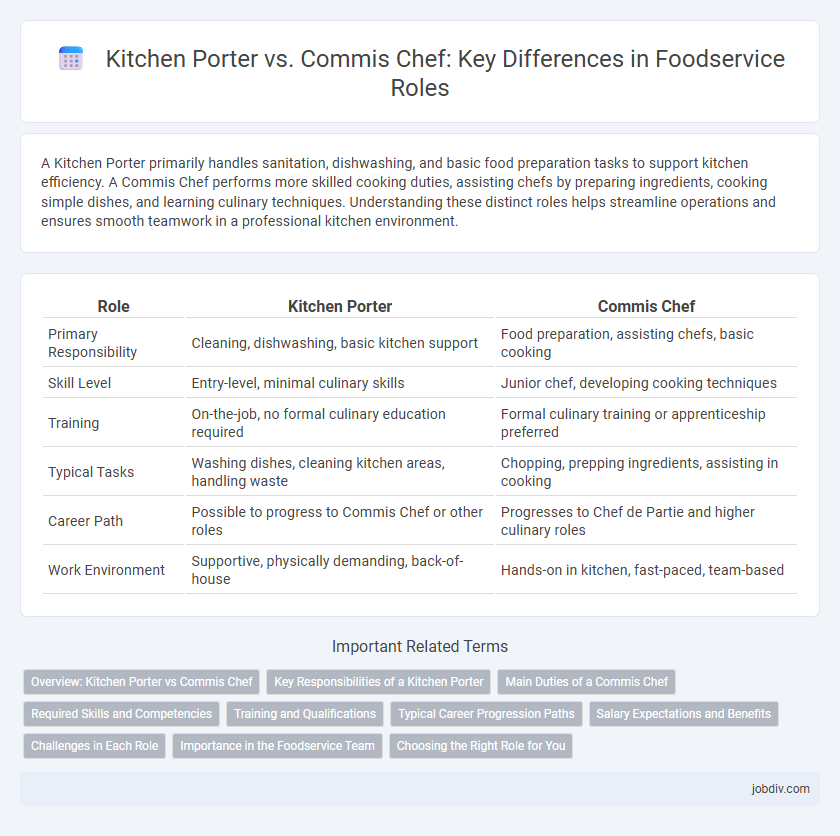A Kitchen Porter primarily handles sanitation, dishwashing, and basic food preparation tasks to support kitchen efficiency. A Commis Chef performs more skilled cooking duties, assisting chefs by preparing ingredients, cooking simple dishes, and learning culinary techniques. Understanding these distinct roles helps streamline operations and ensures smooth teamwork in a professional kitchen environment.
Table of Comparison
| Role | Kitchen Porter | Commis Chef |
|---|---|---|
| Primary Responsibility | Cleaning, dishwashing, basic kitchen support | Food preparation, assisting chefs, basic cooking |
| Skill Level | Entry-level, minimal culinary skills | Junior chef, developing cooking techniques |
| Training | On-the-job, no formal culinary education required | Formal culinary training or apprenticeship preferred |
| Typical Tasks | Washing dishes, cleaning kitchen areas, handling waste | Chopping, prepping ingredients, assisting in cooking |
| Career Path | Possible to progress to Commis Chef or other roles | Progresses to Chef de Partie and higher culinary roles |
| Work Environment | Supportive, physically demanding, back-of-house | Hands-on in kitchen, fast-paced, team-based |
Overview: Kitchen Porter vs Commis Chef
A Kitchen Porter primarily handles cleaning, basic food preparation, and maintaining kitchen hygiene to support smooth kitchen operations, while a Commis Chef is an entry-level culinary position focused on assisting chefs with food preparation, cooking techniques, and learning kitchen skills. The Kitchen Porter role requires less culinary expertise but is essential for efficient workflow, whereas the Commis Chef role demands foundational cooking knowledge and offers career progression towards specialized chef positions. Both roles are critical in the hierarchy of a professional foodservice kitchen but differ significantly in responsibilities and skill requirements.
Key Responsibilities of a Kitchen Porter
A Kitchen Porter primarily handles cleaning duties, dishwashing, and maintaining kitchen hygiene to ensure a safe and efficient workspace. Their responsibilities include washing pots, pans, and kitchen utensils, disposing of waste, and assisting chefs with basic food preparation tasks like peeling vegetables. Unlike Commis Chefs who focus on cooking and food preparation, Kitchen Porters provide essential support that enables smooth kitchen operations.
Main Duties of a Commis Chef
A Commis Chef primarily handles food preparation tasks such as chopping, peeling, and portioning ingredients, ensuring consistency and quality in every dish. They work under the guidance of senior chefs to assist with cooking, plating, and maintaining kitchen hygiene standards. Unlike Kitchen Porters who focus on cleaning and basic support duties, Commis Chefs have a more technical role involving direct preparation of menu items and learning culinary techniques.
Required Skills and Competencies
Kitchen Porters require strong organizational skills, attention to cleanliness, and the ability to handle repetitive tasks efficiently, ensuring smooth kitchen operations and hygiene standards. Commis Chefs need culinary knowledge, knife skills, and the ability to follow complex recipes accurately, demonstrating creativity and precision in food preparation. Both roles demand stamina and teamwork, but commis chefs must also develop time management and basic cooking techniques essential for career progression in the foodservice industry.
Training and Qualifications
Kitchen Porters typically require minimal formal training, often gaining skills through on-the-job experience, while Commis Chefs usually undergo formal culinary education or apprenticeships to build foundational cooking techniques. Commis Chefs receive structured training in food preparation, hygiene standards, and kitchen operations, preparing them for progression to higher chef roles. Kitchen Porters focus primarily on essential kitchen maintenance and basic food handling tasks, requiring less specialized qualifications compared to the technical culinary skills and certifications expected from Commis Chefs.
Typical Career Progression Paths
Kitchen Porters typically start in entry-level roles focused on cleaning and basic food preparation, gradually gaining experience to move into more skilled positions such as Commis Chef. Commis Chefs undergo formal culinary training and work under Chef de Partie to develop technical cooking skills, often progressing to roles like Chef de Partie or Sous Chef. Career progression in foodservice kitchens involves moving from support roles like Kitchen Porter to skilled culinary positions, with practical experience and qualifications accelerating advancement.
Salary Expectations and Benefits
A Kitchen Porter typically earns between $18,000 and $22,000 annually, reflecting entry-level responsibilities primarily in cleaning and basic food preparation, while a Commis Chef's salary ranges from $22,000 to $28,000 due to their involvement in culinary tasks and kitchen operations. Benefits for Commis Chefs often include culinary training opportunities, career progression prospects, and employee meal allowances, whereas Kitchen Porters may receive standard benefits such as paid breaks and uniform provisions. Salary growth for Commis Chefs aligns with skills development and increased kitchen responsibilities, contrasting with the more limited advancement and pay scale for Kitchen Porters.
Challenges in Each Role
Kitchen Porters face physical challenges such as constant cleaning, dishwashing, and moving heavy equipment, which demand stamina and resilience in fast-paced environments. Commis Chefs encounter culinary challenges including precise food preparation, mastering cooking techniques, and maintaining consistency, requiring strong technical skills and attention to detail. Both roles grapple with time pressures and teamwork dynamics critical to smooth kitchen operations and service quality.
Importance in the Foodservice Team
Kitchen Porters play a crucial role in maintaining hygiene and efficiency by handling cleaning, dishwashing, and basic food prep, ensuring a smooth workflow in busy kitchen environments. Commis Chefs contribute to foodservice quality by assisting senior chefs with food preparation and cooking tasks, developing culinary skills essential for menu execution. Together, both roles support operational stability and uphold food safety standards, making them indispensable to the success of any foodservice team.
Choosing the Right Role for You
Choosing between a Kitchen Porter and a Commis Chef depends on your experience and career goals within foodservice. Kitchen Porters focus on cleaning, basic food prep, and maintaining kitchen hygiene, ideal for entry-level candidates seeking to understand kitchen operations. Commis Chefs handle food preparation under supervision, offering hands-on culinary skills development for those aiming to advance in a professional kitchen setting.
Kitchen Porter vs Commis Chef Infographic

 jobdiv.com
jobdiv.com